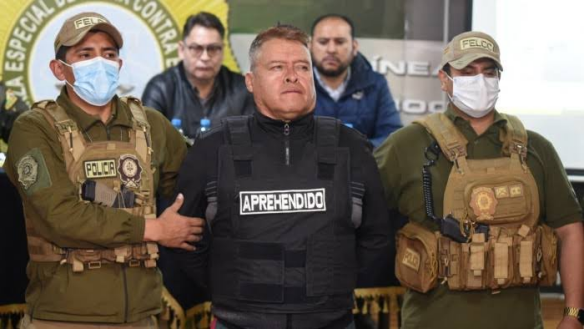
Bolivian Police Arrest General Juan José Zúñiga, Leader of Apparent Coup Attempt in La Paz
By Fiona Nanna, ForeMedia News
6 minutes read. Updated 2:00PM GMT Thurs, 27, 2024
In a dramatic turn of events, Bolivian police have apprehended General Juan José Zúñiga, the leader of an apparent coup attempt, mere hours after soldiers stormed the presidential palace in La Paz. This development has thrown the South American nation into political turmoil and raised international concerns over the stability of Bolivia’s democracy.
The situation escalated rapidly as hundreds of troops and armored vehicles descended on Murillo Square, the epicenter of Bolivia’s government. One armored vehicle even attempted to breach the entrance of the presidential palace. Amidst this chaos, General Zúñiga declared his intention to “restructure democracy,” initially claiming to respect President Luis Arce while signaling an imminent change in government.
However, General Zúñiga was swiftly arrested after publicly stating that the military intervention was orchestrated at President Arce’s request. This arrest was a crucial turning point, as moments before his detention, Zúñiga alleged that the president had instructed him to deploy armored vehicles to bolster his waning popularity.
As the coup attempt unfolded, dramatic footage from inside the presidential palace surfaced. The footage captured President Arce confronting General Zúñiga, ordering him to step down and vacate his role. The tense exchange occurred amidst loud bangs and a flurry of activity from aides, journalists, and armed police officers.
Earlier, President Arce condemned the coup attempt in a televised address, urging the public to mobilize in defense of democracy. “We cannot allow once again coup attempts to take Bolivian lives,” he stated, prompting a wave of pro-democracy demonstrations across the country.
The aftermath of the coup attempt saw significant repercussions. President Arce announced the appointment of new military commanders, confirming the dismissal of General Zúñiga, who had previously made inflammatory comments about former President Evo Morales. Morales, who also denounced the coup attempt, called for criminal charges against Zúñiga and his associates.
In a move to restore order, the public prosecutor’s office initiated a criminal investigation. Additionally, Vice-Admiral Juan Arnez Salvador, head of the Bolivian Navy, was arrested, signaling a broader crackdown on those involved in the attempted coup.
The motivations behind General Zúñiga’s actions remain unclear. On the eve of the coup attempt, Zúñiga had vowed to arrest Morales if he sought office again, despite Morales being barred from running. This statement, combined with accusations of an elite takeover and vandalism, added layers of complexity to Zúñiga’s motivations.
Opposition senator Andrea Barrientos suggested that economic and judicial crises might have driven President Arce to orchestrate a “self-coup,” though this claim remains unverified. Bolivia is grappling with significant economic challenges, including a US dollar shortage and rising living costs, which have exacerbated political tensions.
The coup attempt has thrust Bolivia back into the spotlight, highlighting the nation’s ongoing struggle with political instability. President Arce, who assumed office after a period of turmoil following the 2019 election, faces renewed challenges in maintaining democratic governance.
Close allies, including the left-wing governments of Venezuela and Colombia, swiftly condemned the coup attempt, emphasizing the need for democratic stability. The United States and other regional powers echoed these sentiments, calling for calm and a return to constitutional order.
The swift response to the coup attempt has underscored the resilience of Bolivia’s democratic institutions. However, concerns persist about potential repercussions. Human rights activist Jhanisse Vaca Daza warned that the government might use the coup attempt as a pretext to suppress opposition, raising fears of increased political repression.
Political analyst Carlos Toranzo pointed to ambiguities in the coup narrative, suggesting that the events might have been orchestrated to consolidate power. “It’s strange,” Toranzo remarked, noting the unusual calm and lack of communication disruptions typical of coup attempts.
As Bolivia navigates this tumultuous period, the swift arrest of General Zúñiga and the government’s decisive actions signal a commitment to preserving democracy. However, the underlying political and economic tensions suggest that Bolivia’s path to stability remains fraught with challenges.
For more updates on the situation in Bolivia and other global news, visit our news section.

